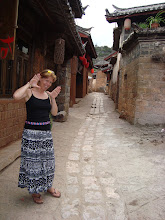 Taking the warnings to heart, I was a little nervous about the complexity of The Mahabharata, so I decided to approach it with the heart of a child; for after all, don’t myth traditions start with stories to children?
Taking the warnings to heart, I was a little nervous about the complexity of The Mahabharata, so I decided to approach it with the heart of a child; for after all, don’t myth traditions start with stories to children?The Illustrated Mahabharatha for Children is an enjoyable collection of the stories we watched in the movie; however, it manages to explain things that weren’t explained (like Amba giving up one of her lives to reappear on the battlefield in her second life) and to do so in an undauntedly pleasant fairytale-style. Here is the beginning of the chapter, “The Exile”:
To be in exile in a forst is a very tough experience because a forest is full of wild animals. It is an area where Rakshasaas roam about freely. Mostly it is dark in the forest. One has to go in search of water and live on tubers and fruits. The Pandavas who had always lived in a royal style had to face all such hardships in the forest. But their courage and their righteousness never failed them.
We’ve never discussed translations—how they influence the text that ends up in our hands. I know we read Fagle for The Iliad over reading Lattimore, Chapman, Fitzgerald, Rieu or the other 20+ English translations. We are getting at least two interpretations of The Mahabharata (Peter Brook and Chakravarthi V. Narasimhan), but I am glad that I am able to make time for this third kid-stuff version!

This looks fantastic, and as you said before, my son will love it. So will I!
ReplyDeleteYou bring up an excellent point, one almost always at issue with mythology--the problem of translation. There are a number of English translations of The Mahabharata. Our version was chosen for several reasons--it's shorter, always a boon to students with heavy reading loads (remember that it is some 88,000 verses long...), it is pretty accurate, and, it provides a good sense of the story while still retaining some sense of the beauty in the original (at least in my opinion).
Translators approach their task with different goals, different attitudes. Whenever I translate something, I shoot for accuracy and a literal, but readable translation. Far more skilled linguists than I can often project some of the poetry of the original language into their versions, but this is something not everyone can (or should) do. It's always a trade-off. For example, the Ta/in, our epic for Celtic mythology, is one I've read in both the original Irish and in just about every English translation. Most have something to offer, most also have flaws. For me, much of the humor is lost in English translations, and there is a fair amount of subtle, if often ribald, humor in this otherwise bloody epic.
You will notice too that there are various ways to spell the names. I suggest sticking to the system in our edition of The Mahabharata: these names can be confusing enough without trying to master several methods of transliterating Sanskrit.
This is not a class about linguistics, the finer points of translation, or the like, but I thought it was worth discussing briefly because it is, as you rightly point out, an issue. You want to be sure what you are reading is what you are meant to read, if you follow me.
Jesssica - this children's book looks great! A fantastic idea to start off there. I know that's how I first found out about many great works of literature (Connecticut Yankee in King Arthur's Court, Robinson Crusoe, Little Women, to name just a few).
ReplyDeleteProf. - I look forward to hearing about the differences among translations when we get to the Tain! I love hearing different languages as well - do you also speak Irish as well as read it? I have heard Irish only briefly and was surprised to find it sounded very different overall than I imagined it would. You should do a reading of a passage for us! :-)
I'd be happy to chat about it--Carson's version, I should have said, does retain a bit of the more ribald stuff, but doesn't always retain the word-play.
ReplyDeleteI do not speak Irish much at all, and what little I do is limited and heavily accented (my mentor in Celtic is Hungarian so that is the accent I learned! ;-) I studied Old and Middle Irish mostly, but I am fortunate to know many modern Irish speakers so I do get to practice now and then. I'll happily read a passage for you, though again, my pronunciation will probably leave much to be desired.
Just a reminder request about reading a passage in Irish since we are getting close to the Tain. :-)
ReplyDelete